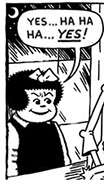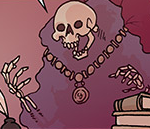|
Honestly, I think it's that same irritant that gets us 4E/other game players. Dungeons & Dragons controls player access. They want current D&D to be the kind of D&D they like because 90% of people will play it because its The D&D.
|
|
|
|

|
| # ? May 25, 2024 00:49 |
|
The edition wars will never end huh
|
|
|
|
Pollyanna posted:Remind me again what the difference between 4e and 5e is, insomuch as it matters for edition pissmatches? 4e was a direct response to the wide spectrum of criticisms against 3e. Some examples: People said spellcasters dominated every aspect of the game while mundane classes had very little room to grow in their own niche, so 4e revamped class abilities into a standardized at-will/encounter/daily/utility format. They reinforced niche protection by turning the classic fighter/wizard/rogue/cleric party format into formal class roles with each class having a primary and secondary role with unique mechanics that defined each role. They saw the complaints about how ridiculously arbitrary monster challenge ratings and encounter design were and completely rebuilt the system. They also tossed out save-or-die spells and altered how save-or-sucks work on both monsters and PCs. Monster hp/damage math was still a bit off to begin with but the revised math from MM3 on is great. They also revised a lot of things related to alignment based on criticisms that existed before 3e but continued through it. The alignment axis was simplified down from the nine aligments to lawful good - good - neutral - evil - chaotic evil. (The middle version of Basic did something like this too, iirc) They did away with alignment creature stereotypes and alignment restrictions on player classes like the paladin. They also relaxed the paladin's code of conduct a ton and tossed out "falling" mechanics. People said there's a really narrow "sweet spot" for playing in 3e, generally around 6-12th level, so they altered class progression and split it up into 3 tiers of 10 levels. This bit ended up falling the most flat because they still supported 1-10 and 11-20 waaaay more with monsters and adventures than 21 to 30. The number of class abilities started getting pretty out of hand by then too. These were rolled back to varying degrees with 5e. 4e still had a lot of bugs but none of them were fixed with 5e.
|
|
|
|
5e sought to throw out most of what 4e did and instead tries to implement it's own fixes to problems in 3.x. Unfortunately the fixes chosen are mostly '[mechanic] was fiddly and didn't work great? Just delete it!' -3.x monster challenge rating math was bad and monster creation was over complex? Solution: make both systems undersupported and vestiges, and let the DM just do what feels right. -Prestige classes and multiclasses were fiddly and led to wierd build shenanigans? Solution: limit all character customization options to choices of extremely minor functional changes in the form of class archetypes. -Wealth by level coadvancement system took too much bookkeeping and restricted DM reward 'creativity' too much? Solution: make gold useless and put handing out magic items almost entire dice or DM fiat. -Too many modifiers that were too hard to keep track of and had too many complicated stacking rules? Solution: delete virtually all modifiers but don't adjust the math very much, in effect making most tests just come down to how well you roll on the d20. -spellcasters too powerful, dominate the game? Solution: lol remove all the mechanism is by which non casters could make themselvea viable and make the math less reliable such that autosuccess through spell is even more vital to ensuring adventures don't die to bad skill checks. Also literally only nerf save or dies, and not the myriad save or lose spells or the vastly superior damage casters can inflict. Whoops didn't fix that one. Basically 5e enshrines how lazy and bad dms ran 3.x. In the hands of a competent DM I would vastly prefer to play a 3.x game, because the primary innovations of 5e are just cutting content and replacing it with nothing.
|
|
|
|
fool_of_sound posted:5e sought to throw out most of what 4e did and instead tries to implement it's own fixes to problems in 3.x. Unfortunately the fixes chosen are mostly '[mechanic] was fiddly and didn't work great? Just delete it!' This hits my 5E dislike pretty hard on the head. It's a game that makes me feel nostalgic fondness for 3.x. Ew.
|
|
|
|
Splicer posted:Anyone played tales from the loop?
|
|
|
|
Like, my go to example of 3.x versus 5e is the Rogue class. -3.X Rogue had problems; they had access to a lot of skills, but wizards could replicate most of those skills with spells. Their big combat role was strongly tied to either getting flanking bonuses in a not-very-tactical system, or else trying to re-establish stealth after every attack. Even then, mundane stealth was defeated by any of the blind-sight variants, and a huge chunk of enemies were outright immune to sneak attack damage, making rogue useless against them. -That said, because of the pretty lol math of 3.5, and how easy it was to stack modifiers, a rogue player with a degree of system mastery and some splatbooks could in fact make their skills so good that they could directly compete with spells, and could negate most of the weaknesses of sneak attack. For a single feat and a one level dip into warlock, they could guarantee sneak attack every turn. With another feat or certain magic items, they could ignore most sneak attack immunities, and negate blind-sight. They could get so good at hide and move silently that they basically had permanent greater invisibility. They could stack Bluff and Diplomacy until RAW they were so persuasive they could effectively mesmerize entire encounters . They could ignore class restrictions on magic items and use scrolls and staves and such to back up the wizard when spells were called for. This was dumb and fiddly and bad design, but they could actually DO crazy heroic feats. In your chosen field, you could feel powerful and useful. -Meanwhile you have 5e Rogue, who is worse at every single skill than Bard, and who has a garbage sneak attack that cannot being meaningfully improved. It is effectively playing a 3.X Rogue with no system mastery and no splatbooks; just hoping that maybe you get to try to roll a d20 to sneak past a guard or pick a lock before the wizard just casts Invisibility or Knock, since in fact your skills are too unreliable to risk the adventure on, especially since there's still no fail forward mechanic.
|
|
|
|
fool_of_sound posted:-Meanwhile you have 5e Rogue, who is worse at every single skill than Bard, and who has a garbage sneak attack that cannot being meaningfully improved. It is effectively playing a 3.X Rogue with no system mastery and no splatbooks; just hoping that maybe you get to try to roll a d20 to sneak past a guard or pick a lock before the wizard just casts Invisibility or Knock, since in fact your skills are too unreliable to risk the adventure on, especially since there's still no fail forward mechanic.
|
|
|
|
That antifa RPG SIGMATA is out on DTRPG. Link. For those not in the know, SIGMATA was a 1980s cyberpunk alternate history where the US government is overtaken by fascists (and the overt "Heil Hitler" kind judging from the preview art). Unfortunately the writer several months ago didn't seem to have a good grasp on US politics when 3 out of the 4 resistance fighter factions were some variety of right-wing or the types of people who'd end up in the modern-day alt-right. AnCap businessmen, militia rednecks who can end up as white supremacists, and fundamentalist Christians to be specific. The fourth faction was a Communist one who was at risk of being taken over by pro-Soviet tankies. Now I don't know how much the author took the earlier criticisms to heart, but I'm morbidly curious as to how the final product turned out.
|
|
|
|
Rednecks and christians can be anti-fascist.
|
|
|
|
Touching on Shadow of the Demon Lord for a moment, how do people who've played it find the Bane / Boon system? It seems superficially good for reducing bookkeeping on modifiers, and it seemed easy enough to handle running LANCER, but in a hypothetically tactics-focused game, is it just a little too flaky to be a reliable indicator of success on a given roll?
|
|
|
|
Zeerust posted:Touching on Shadow of the Demon Lord for a moment, how do people who've played it find the Bane / Boon system? It seems superficially good for reducing bookkeeping on modifiers, and it seemed easy enough to handle running LANCER, but in a hypothetically tactics-focused game, is it just a little too flaky to be a reliable indicator of success on a given roll? nah, it owns actually. it's less swingy than something like advantage and its also way less abusable than stacking modifiers. and since your target number for skill checks is always 10, you have a decent chance of success regardless. in combat you have a similar effect, but the goal is to keep yourself at least positive by 1 boon, because mathematically the power of additional boons falls off quick. and lots of things in sotdl impose banes, especially when you're playing with monsters that have frightening/horrifying
|
|
|
|
People posted:4e vs 5e Hm. I’m just gonna stick to PbtA.
|
|
|
|
Zeerust posted:Touching on Shadow of the Demon Lord for a moment, how do people who've played it find the Bane / Boon system? It seems superficially good for reducing bookkeeping on modifiers, and it seemed easy enough to handle running LANCER, but in a hypothetically tactics-focused game, is it just a little too flaky to be a reliable indicator of success on a given roll? It's one of the best things about the game, along with Fast Turn / Slow Turn replacing initiative. I have a lot of minor gripes with SotDL but I want boon / bane in everything. It's easy to calculate the average result of Xd6 keep highest, it keeps everything within reasonable bounds, and automatically implements diminishing returns on stacking advantages. This also works in reverse; trading down from 1 boon to zero or zero to 1 bane is a BIG drop in your effectiveness, and you want to work as hard as possible to keep your boon in that situation, but having multiple boons encourages you to trade them in for special attacks (which, appropriately, often cost boons.) It's like if the old 3.5 Power Attack dynamic actually made tactical sense. It's wonderful.
|
|
|
|
Yeah, Boon/Bane (or Accuracy/Disadvantage in Lancer parlance) is a pretty solid system which is better than D&D5E's version for all the reasons people have listed here, it's quick and simple, it's got a lot of good design space to explore with regards to spending stacks of Boon, and it keeps modifiers within a consistent range. It does mean that you don't have the thing where you can endlessly stack modifiers to reach the point where you only miss with your attack on a 1 if that's considered a positive feature for you (I wouldn't say it is but I understand the impetus behind it). In Lancer's case in particular every mech has the ability to make multiple attack rolls on their turn (or in 1.7 you can make multiple attack rolls OR make a single attack and then another action like hacking or deploying systems) which means that accomplishing something on your turn doesn't rely upon the turn of a single d20 roll.
|
|
|
|
If you want your player to reliably succeed, don't make them roll. The point of a roll is for when it's uncertain.
|
|
|
|
Libertad! posted:That antifa RPG SIGMATA 
|
|
|
|
Tuxedo Catfish posted:It's one of the best things about the game, along with Fast Turn / Slow Turn replacing initiative. I have a lot of minor gripes with SotDL but I want boon / bane in everything. Somehow I never really made the connection with Power Attack but you're absolutely right. Trading boons for benefits is like Power Attack that works precisely because of the way boons bound the math.
|
|
|
|
Splicer posted:Anyone played tales from the loop? You are in luck! RPPR has an actual play here: http://actualplay.roleplayingpublicradio.com/2018/07/genre/sci-fi/tales-from-the-loop-boulder-city-episode-1/ There will be 4 episodes in this campaign.
|
|
|
|
Doorknob Slobber posted:Anyone want to sell me on Mutant Year Zero? Its in the bundle of holding and I might give it a shot. I'm also curious about this!
|
|
|
|
fool_of_sound posted:Like, my go to example of 3.x versus 5e is the Rogue class. 3e really did exist in an interesting position. You could really tell that the game devs were reading the charop posts on the official forums and taking notes as they went along. It resulted in a lot of experimentation that did improve at least most of the base classes somewhat, either through slipping in some feats or alternate class abilities. Plus, the different experiments in power level with the more impactful melee base classes and more focused casting classes that came out later on. They had the resources and production schedule to stick a lot of band-aids on a broken system that 5e can't through first-party means.
|
|
|
|
Cross-posting from the 4E thread, where I said (paraphrasing) that if I were going to change anything about the roles in D&D 4E, it wouldn't be to remove Controllers -- it'd be to get rid of the DPS / Healer / Tank trinity altogether. (The question then being -- what would you replace it with?) I wanted to make a whole big effort post about this and I might still do that on the weekend when I feel more alive, but for now, a cliffnotes version: The first option is to simply make characters more generalist. Instead of being defined by a single specialized role, characters can perform most of the basic functions needed to win the game, with one or maybe two gaps in their functionality that must be filled by teammates. This way you have both a choice of strategy (what do I need to accomplish this turn) and tactics (what is the best way to accomplish it?) The cost for this is less build / character variety, which can be compensated for with class-specific mechanics, such as different resource systems, ideal engagement ranges, and so on. 4E already does this to a fair extent, especially with Leaders and Controllers. People often complain about Controllers stepping on other roles' toes, and they're not wrong, but I see that more as a tension between two sets of pros and cons, not as a strict negative. The second option (which is really a vast number of potential options) is to divide things along an axis other than damage. DPS / Healer / Tank is essentially "deal, undo, and prevent damage, respectively;" it's not just about being good at different things, it's about one role that brings things closer to your win condition and two roles that keep the enemy from achieving their win condition, and that win condition is damage. Now, by way of contrast, imagine if your win condition (in place of or in addition to just clearing the field via damage) were to survive until your most powerful abilities come online. You could have "Early", "Middle" and "Late" characters; Early characters start with a large but non-refilling pool of resources and have abilities that accelerate and set up your win condition, Middle characters get a steady drip of resources and delay or even steal progress from your enemies, and Late characters have conditional requirements to build up their resources and are devastating once they "arrive." Every character should still has something to do all encounter long. Middle characters have it natively. Early characters' limited abilities (think Encounter powers) are the ones that nurture progress, while their unlimited abilities (like At-Wills) are more about creating preconditions for success of the big guns; forced movement and Leader-style buffs would be good. Late characters would have lots of evasive and opportunistic abilities at first, and then slowly escalate into effects that pretty much end the encounter (with a little help from their friends). This is a clumsy and very abstract example of the kind of thing I have in mind, and I could write a lot more about why I don't like DPS / Healer / Tank very much, but I hope it's at least illustrative that there are other ways you could do things, and that it would be interesting to explore and refine them. Another brief example would be -- if you had a King of the Hill-type game based on taking and holding territory, with multiple capture points and a win condition of holding all of them, you could have roles specialized in Assault (push the enemy off a zone), Defense (hold a captured zone, block enemies from entering), and Interference (get on an enemy-held zone and force them to commit to it.)
|
|
|
|
This sounds like a game that would be more crunchy than would interest me personally but please do this writeup. I'm personally pretty tired of DPS/tank/healer in all areas of gaming but a lot of designers seem to feel it's a good trifecta for keeping roles fresh. I'd love to see something different. It's one thing I like about Monster Hunter--everyone has the same basic capabilities but the weapons manage to make the game play very differently for people.
|
|
|
|
Correct me if I'm wrong, but that sounds to me like, if I wanted to play a "Late" character, I would be invested in making fights go on as long as possible, and contribute very little if they didn't. That sort of thing might be totally fine in a videogame, but I don't think that most people want to pick slow-burn classes in a tabletop setting.
|
|
|
|
If nothing else, the last thing 4e needs is mechanics that encourage making fights last longer
|
|
|
|
beeoi posted:Correct me if I'm wrong, but that sounds to me like, if I wanted to play a "Late" character, I would be invested in making fights go on as long as possible, and contribute very little if they didn't. That sort of thing might be totally fine in a videogame, but I don't think that most people want to pick slow-burn classes in a tabletop setting. It would be important to limit the extent to which delay is possible, as well as the risk of an early blow-out victory; Late characters' power should also probably grow gradually instead of all at once. Things should generally wrap up in a certain number of turns by design. This is a very important design problem to solve but it's not really that different than making sure that healing doesn't overwhelm damage, or rocket tag negate healing. Every competitive game needs an element of entropy. cheetah7071 posted:If nothing else, the last thing 4e needs is mechanics that encourage making fights last longer It does the exact opposite of that; it ensures that when you reach the win condition, fights end right there, without the need for mop-up. It gives you design space to include more definitively game-ending abilities, without allowing them to end the encounter round 1 (because that's not good either.) Tuxedo Catfish fucked around with this message at 02:25 on Jul 24, 2018 |
|
|
|
Basically I'm trying to imagine a situation where Sleep isn't bad game design. 
|
|
|
|
I think they would would fights that went on at least some number of turns, but not necessarily benefiting proportionally with further turns beyond that. If your average combat lasts some number of rounds, early characters would do reliably more in the first third of , middle characters in the middle third, and late characters in the last third. I think grouping your characters that way is independent of how many rounds the average combat actually has. I assume encounter design would also reflect intentional use of those roles, which would vary the relative burden between party members based on enemy composition. You want to be the guy who set up devastating moves over a few turns if you're fighting enemies that are particularly strong in the Early phase and bully your early characters hard. I understand what you're saying about creating an incentive for some players to make fights go on longer, relatively speaking
|
|
|
|
I mean, Spellbound Kingdoms has something like that. In fact, here's a explaination someone did recently:paradoxGentleman posted:There is a variant of Spellbound Kingdoms combat rules that works like that. Basically you both choose your maneuvre, and reveal it at the same time. So it's possible that like, your opponent is building up to an awesome 5 damage attack and you, since you know his fighting style and you can see where this is going, move to another zone so he's left fighting the air. Of course, he can hit you with the "build up" maneuver, the one meant to... actually let me give a visual example.
|
|
|
|
Tuxedo Catfish posted:Basically I'm trying to imagine a situation where Sleep isn't bad game design. Stoner metal RPG about flying through space on dragons, navigating deadly Hashteroid fields to land your crew of Marijuanauts in the TH Sea. Maybe navigating the war-torn ruins of Funeralopolis, avoiding the minions of the Electric Wizard to find the sole druid able to bring forth the potent flowers again.
|
|
|
|
Haystack posted:I mean, Spellbound Kingdoms has something like that. In fact, here's a explaination someone did recently: I'm aware, and excited to try it! I would have liked to draw on it as an example, but I haven't actually played it and wouldn't want to misrepresent it or myself.
|
|
|
|
Hedningen posted:Stoner metal RPG about flying through space on dragons, navigating deadly Hashteroid fields to land your crew of Marijuanauts in the TH Sea. Maybe navigating the war-torn ruins of Funeralopolis, avoiding the minions of the Electric Wizard to find the sole druid able to bring forth the potent flowers again. Sleep's Dopesmoker is basically a Dark Sun campaign. Dank Sun, if you will.
|
|
|
|
Doorknob Slobber posted:Anyone want to sell me on Mutant Year Zero? Its in the bundle of holding and I might give it a shot. Overall, Mutant: Year Zero is a marriage of story game elements to base building and hex crawl mechanics. The feel is more of a ragtag group of struggling survivors who happen to be mutants; rather than a Fallout game where safety and stability increases in a linear fashion with the more gear you accumulate. For conflict resolution, you roll d6s. Generally you add your attribute score, skill level and gear, and roll that many dice. One six is a success, and extra sixes generate crits or bonus effects. To attempt to get extra successes, you can attempt to push the roll once. ‘Pushing’ involves grabbing any dice that did not roll a 1 or a 6 and rolling them again. The danger to pushing is that any 1’s rolled on the attribute dice will cause trauma to the attribute you used. The benefit is that you get a number of mutation points (used to activate a mutation) equal to the 1’s that cause attribute trauma. The rational is, when you exert yourself your mutant powers may bubble up to the fore and radically twist your body and mind. The story game elements come into play when you make your mutant character, and they determine how you earn exp. During character creation, a player chooses a ‘buddy’ PC, a NPC that they hate, and a NPC that they want to protect. You also chose the character’s “Big Dream”. Experience is doled out if the player risks something in pursuit of protecting a buddy PC or NPC, working towards the “Big Dream”, or meddling with their hated NPC rival. This is not a game where cutting down mass quantities of rot ghouls is going to net you that next level. Players can improve the Arc with the base building mechanics. Imagine Civ5 tech tree but for a dilapidated post-apocalyptic citadel. For example, you can have the NPCs in the Arc work on developing mushroom fields (or cannibalism!) to improve the Development Level of your Food technology. If the players come across a piece of gear like a M-16, they can either chose to use the gear personally or turn it into the Arc for an appropriate boost in a Development Level. For example, turning in that M-16 will make Warfare improvements develop faster, but have no effect on Food improvements. As I recall these rules earned Mutant: Year Zero a Silver Ennie. The Game master section has a series of tables and charts to generate random Zone encounters on a hex crawl through the Wasteland, or you can use the premade Zone locations. One of my favorites is the warren of mutant anthropoid rabbits who are militant against meat eaters. One rabbit is an easy mark, but they appear in frothing fanatic droves. The only actual play of Mutant: Year Zero I have found is the intro adventure False Haven, run by Tom of the RPPR crew. http://actualplay.roleplayingpublicradio.com/2016/10/genre/sci-fi/mutant-year-zero-false-haven/#comments Keep in mind this game only sets the scene, and doesn't get into hex exploration of the zone or the improving your Arc (base) mechanics.
|
|
|
|
another thing i want to try is a system where instead of individual characters having HP, there's just one pool for the players and one pool for the monsters that's mostly just a selfish GM's fantasy though, more time in which to show off cool enemy mechanics 
|
|
|
|
Good news guys, WotC is finally putting out a real physical campaign setting book for Ravnica with D&D 5e rules. They also released a $20.00 PDF with D&D 5e rules for Eberron. The PDF cover is D&D 4e Eberron art.
|
|
|
|
Nuns with Guns posted:Good news guys, WotC is finally putting out a real physical campaign setting book for Ravnica with D&D 5e rules. Oh poo poo it really is the 4e cover for Eberron. Extremely lol.
|
|
|
|
Chapter 1 image for the Campaign Guide, but yeah lol
|
|
|
|
Part of me would pay for a kickstarted D&D 5 edition Dark Sun Campaign book. If it piggy backed on the 4ed book and didn't suck.
|
|
|
|
It looks like it's actually a playtest set of rules that explicitly tells you it isn't official after you buy it for $20, so it's kind of like a community title masquerading as an official one. I'm a little irritated.
|
|
|
|

|
| # ? May 25, 2024 00:49 |
|
They’ve said they’ll update it and then turn on POD after.
|
|
|


































